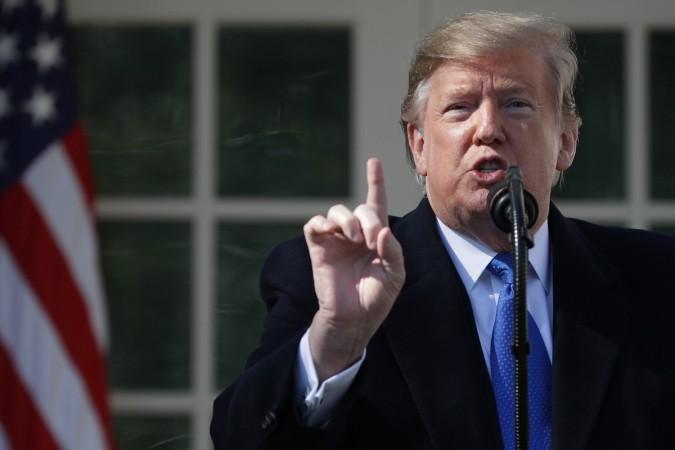
After failing to convince the Congress to give him funds to build the much-talked about wall along the Mexico border, United States President Donald Trump declared a national emergency on Friday, February 15. The wall was one of the most important pledges that Trump had made during his presidential campaign, but he hasn't been able to fulfil the promise yet due to resistance from several quarters.
Now, the president intends to gain an access to millions of dollars that are required to build the 3,200 km (approx) wall and the funds are likely to be the taxpayer money diverted from military projects and other plans.
In a televised statement from the White House Rose Garden, Trump said that the plan would allow him to access about $8 billion for "wall works," but the amount is still must lesser than the required estimate of about $23 billion.
"We're going to confront the national security crisis on our southern border," Trump said in the televised address. "We have an invasion of drugs, invasion of gangs, invasion of people, and it's unacceptable. Everyone knows that walls work."
The president went on to add that the emergency wasn't really urgent, but that he preferred to build the wall as soon as possible. "I didn't need to do this, but I'd rather do it much faster," he said.
What is a national emergency?
A president can declare a national emergency under the 1976 National Emergencies Act. The act was passed after the Watergate crisis and it requires the White House to submit a justification to why the emergency is being declared.

A national emergency gives the president the power to bypass the general processes in politics and governance. Explaining the idea, Elizabeth Goitein, co-director of the Brennan Center's Liberty and National Security Program told BBC that an emergency gives the president "access to special powers that are contained in more than 100 other laws." In general, she said that "the intent is to provide for badly needed flexibility when there are urgent crises which Congress does not have time to address."
How will the emergency help Trump build the wall?
The president seems to be aware that his step will be met with resistance, along with a stream of legalities, but he is clearly quite keen on the idea. Now that Trump has declared the emergency, the officials of the military can divert funds and resources that are "essential to the national defense" including the "use of the armed forces," reported the Guardian.
In this case, the officials could move funds and personnel to build the wall along the US-Mexico border.
Move facing resistance
Trump decision to declare an emergency and build the wall has been slammed by the Democrats as well as the American Civil Liberties Union. White House counsel Pat Cipollone is likely to be called to the Capitol Hill to explain the idea behind the move and House of Representatives Speaker Nancy Pelosi and Senate Democrat leader Chuck Schumer also said that they would challenge the decision.
"The president's unlawful declaration over a crisis that does not exist does great violence to our Constitution and makes America less safe, stealing from urgently needed defence funds for the security of our military and our nation," BBC quoted the statement as saying.
"This is plainly a power grab by a disappointed president, who has gone outside the bounds of the law to try to get what he failed to achieve in the constitutional legislative process," they said, adding that the Republicans too must join them to defend the constitution.
New York State attorney-general Letitia James has also said that the decision would be challenged. In addition, California Attorney General Xavier Becerra, a Democrat, also has said that he would work with other states to challenge Trump's decision to declare an emergency.
A few Republicans too have spoken up against Trump's move and Rep. Mac Thornberry of Texas said that moving funds for the wall may result in several more important projects being ignored. "Doing so would have detrimental consequences for our troops," the Washington Post quoted him as saying. "And it would undercut one of the most significant accomplishments of the last two years - beginning to repair and rebuild our military. I hope that the president will pursue other options."
Sen. John Cornyn added that an emergency was not a solution and that Trump could have opted for other measures. "I thought there were other, better alternatives," he said.

















